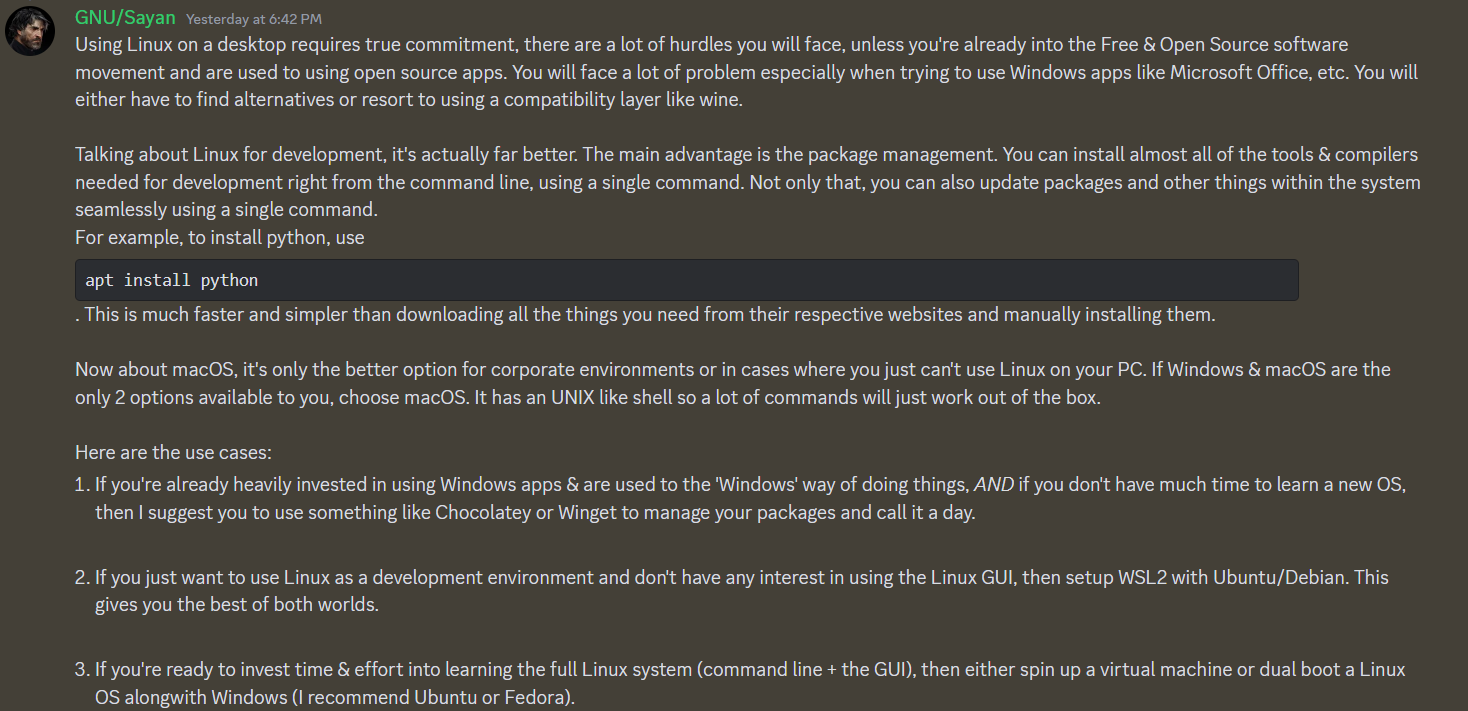Why Linux for Development?
 Ayush Gupta
Ayush Gupta
Why Linux?
This is the question I raised in a discord server and here was the response, sharing the snippet:

*To further understand the response let's first understand what is Unix.
What is UNIX?
Unix is an operating system originally developed in the 1970s. It's a family of multitasking, multiuser computer operating systems that prioritize simplicity, portability, and a modular design.
Unix has had a significant impact on the development of operating systems, serving as the inspiration for numerous Unix-like systems such as Linux, macOS, and the various BSD (Berkeley Software Distribution) variants. It has become a foundation for modern computing, widely used in servers, workstations, and embedded systems.
While the original Unix is no longer commercially available, its principles and influence live on in the Unix-like operating systems that have evolved and expanded upon its foundations. Upcoming is a qna of me and chatgpt i got my answer so will you follow the conversation:-
Why Unix is preferred for development?
Unix-like environments, including Linux and macOS, are often preferred for development for several reasons:
Stability and Reliability: Unix-like systems are known for their stability and reliability. They are designed to handle long-running processes and provide a robust environment for development work. The stability of these systems allows developers to focus on their work without worrying about frequent crashes or system instability.
Powerful Command-Line Interface (CLI): Unix-like systems offer a powerful command-line interface (CLI) that provides extensive control over the system. The CLI allows developers to perform a wide range of tasks efficiently, such as running commands, managing files and directories, automating tasks with scripts, and utilizing various development tools and utilities. The CLI's flexibility and scripting capabilities enable developers to streamline their workflows and automate repetitive tasks.
Rich Development Toolset: Unix-like systems provide a rich set of development tools and utilities. They come with built-in compilers, interpreters, debuggers, version control systems, and package managers, among other tools. These tools are often readily available and well-integrated with the operating system, making it convenient for developers to set up their development environment.
Vast Software Ecosystem: Linux systems have a vast ecosystem of open-source software and libraries. Developers can easily access and utilize a wide range of development frameworks, programming languages, and software packages. The availability of open-source software promotes collaboration and fosters the sharing of knowledge and resources within the development community.
Compatibility and Portability: Unix-like systems adhere to standards such as POSIX, ensuring compatibility and portability across different Unix-like environments. This means that code developed on one Unix-like system can often be easily transferred and run on another without major modifications. This compatibility and portability make Unix-like systems well-suited for cross-platform development and deployment.
Community and Support: Unix-like systems have vibrant communities of developers and enthusiasts who actively contribute to their development and provide support. Online forums, documentation, and tutorials are widely available, making it easier for developers to find assistance and resources when needed.
While Unix-like environments offer many advantages for development, it's important to note that the choice of development environment ultimately depends on individual preferences, project requirements, and the specific tools and platforms being used.
What are usages of Linux:-
Linux is beneficial in a wide range of fields and industries. Here are some notable areas where Linux is particularly advantageous:
Web development: Linux is extensively used in web development for server infrastructure, hosting platforms, and cloud environments. Many web servers, such as Apache and Nginx, run on Linux. Additionally, popular web development frameworks and tools like Node.js, Ruby on Rails, and Django have robust support on Linux.
DevOps and cloud computing: Linux is the foundation for many DevOps practices and technologies. It is the primary operating system for cloud platforms like Amazon Web Services (AWS), Google Cloud Platform (GCP), and Microsoft Azure. Tools like Docker, Kubernetes, Ansible, and Terraform, widely used in DevOps and cloud computing, have strong Linux compatibility and support.
Data science and big data: Linux is highly preferred in the data science and big data fields. Platforms like Apache Hadoop and Apache Spark, used for distributed data processing and analysis, are commonly deployed on Linux. Popular data science libraries like TensorFlow, PyTorch, and scikit-learn are well-supported on Linux distributions.
Artificial Intelligence and machine learning: Linux is widely used in the field of AI and machine learning. Many AI frameworks, including TensorFlow, PyTorch, and Theano, have Linux as their primary target platform. Linux's stability, performance, and access to low-level system resources make it an ideal choice for AI and ML development.
Embedded systems and IoT: Linux is prevalent in embedded systems and Internet of Things (IoT) applications. It is the basis for numerous Linux-based embedded platforms like Raspberry Pi and BeagleBone. Linux's versatility, scalability, and extensive driver support make it suitable for developing embedded systems and IoT devices.
Scientific research and academia: Linux is widely used in scientific research and academia due to its open-source nature and flexibility. It provides researchers with a customizable platform for various scientific simulations, data analysis, and computational tasks. Linux distributions like Ubuntu have gained popularity in educational institutions as well.
Cybersecurity: Linux is known for its robust security features and is often used in cybersecurity operations. Many security-focused distributions like Kali Linux and security tools like Wireshark and Metasploit run on Linux. Its open-source nature allows security professionals to analyze and enhance the security of the operating system.
System administration and IT infrastructure: Linux is a preferred choice for system administration and managing IT infrastructure. Its stability, performance, and command-line interface make it easier to manage servers, networks, and services. Tools like Ansible and Puppet are widely used for automating system administration tasks on Linux.
Linux for MERN
Linux is well-suited for JavaScript MERN (MongoDB, Express.js, React, Node.js) stack development for the following reasons:
Compatibility: Linux offers excellent compatibility with JavaScript development. Node.js, a key component of the MERN stack, has strong support on Linux distributions.
Developer tools: The command-line interface allows for efficient execution of JavaScript code, running scripts, and managing development tasks.
Server deployment: Linux is a popular choice for server deployment, which is a critical aspect of MERN stack applications. Linux-based servers, such as those running Ubuntu or CentOS, offer stability, security, and performance advantages. Developers can easily configure and manage Linux servers to host MongoDB databases, Express.js APIs, and Node.js applications.
Containerization: Linux's strong support for containerization technologies like Docker enables developers to package MERN applications and their dependencies into portable containers. Containerization simplifies deployment and ensures consistency across different environments, making it easier to manage and scale MERN applications.
Customization and flexibility: Linux distributions offer a high level of customization and flexibility. Developers can choose from various distributions and tailor their Linux environment to suit their preferences and requirements.
Performance: Linux is known for its stability and performance, making it a suitable platform for running high-performance MERN applications. The lightweight nature of many Linux distributions, coupled with efficient resource management, contributes to optimal performance and scalability for Node.js-based server-side applications.
In summary, Linux provides a compatible and robust development environment for JavaScript MERN stack development. Its compatibility with Node.js, rich set of developer tools, strong server deployment capabilities, support for containerization, thriving open-source ecosystem, customization options, and performance benefits make it a favorable choice for MERN stack developers.
Linux vs macos (windows give a hi)
As a developer, both Linux and macOS have their advantages and disadvantages. Here are some pros and cons of each:
Linux:
Pros:
Flexibility and Customizability
Open Source and Community
Vast Software Ecosystem
Robust Command-Line Interface (CLI)
Stability and Performance
Cons:
Learning Curve
Hardware Compatibility
Limited Software Compatibility
User Interface
macOS:
Pros:
Seamless Integration
User-Friendly Interface
Development Tools
Unix-Based Environment
Cons:
Limited Hardware Choice
Closed Ecosystem
Cost
Software Availability
Ultimately, the choice between Linux, macOS, and Windows will depend on your specific needs, the development environment you're working with, and your personal preference. It can be helpful to consider factors such as the programming languages and frameworks you use, the tools and software you rely on, and the target platforms you develop for. Experimenting with different operating systems or seeking advice from experienced developers in your field can also help you make an informed decision. (ALSO, NO HARM IN TRYING A NEW OS)
Subscribe to my newsletter
Read articles from Ayush Gupta directly inside your inbox. Subscribe to the newsletter, and don't miss out.
Written by

Ayush Gupta
Ayush Gupta
Pursuing Computer Science.